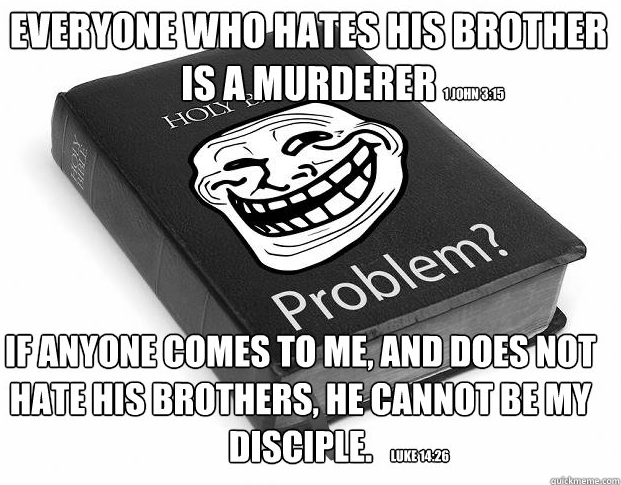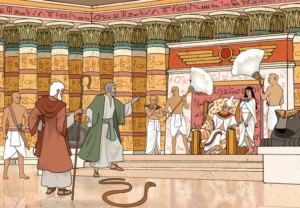One of the common things atheists bring up in conversation with theists is Jesus’ statement in Luke 14:26. In this verse of The Bible, Jesus says “If anyone comes to me and does not hate father and mother, wife and children, brothers and sisters–yes, even their own life–such a person cannot be my disciple.” They will argue that this creates a gigantic contradiction in The Bible given its powerful emphasis on love, forgiveness, and mercy throughout the epistles and gospels, and makes Jesus into a moral monster for commanding us to have hatred in our hearts towards family members. But this argument really belongs in the category of one of the worst arguments atheists come up with, and should go into the same garbage dump as the Christ Myth argument, the “You’re Only A Christian Because You Were Raised In A Christian Home” argument, and the “We breathe from the same hole we eat” argument against Intelligent Design.
My first time reading the verse, I knew exactly what Jesus was talking about. It takes someone who neither knows the character of Jesus, or doesn’t understand basic biblical context to come to the conclusion that Jesus was telling us that we should actually hate those who we should love.
*Everywhere Else, The Bible Places Strong Emphasis On Love.
For one thing, given The Bible’s powerful emphasis on love, this single verse of The Bible should read in the light of truck load of love passages. A basic biblical hermeneutic is to interpret scripture in light of scripture, to interpret unclear passages of scripture in light of clear passages. The Bible teaches very clearly that anyone who has hatred in their heart isn’t a true Christian.
The Bible teaches that hatred is an evil characteristic of a human heart. The Apostle John uses some pretty damning language about people who have hatred in their hearts. He says that anyone has hatred in their hearts is a murderer at heart and that no murderer has eternal life in him. He also says that those who are walking in hatred are walking in darkness.
“If anyone claims, “I am living in the light,” but hates a Christian brother or sister, that person is still living in darkness. Anyone who loves another brother or sister is living in the light and does not cause others to stumble. But anyone who hates another brother or sister is still living and walking in darkness. Such a person does not know the way to go, having been blinded by the darkness.” -1 John 2:9-11
“We know that we have passed out of death into life, because we love the brethren. He who does not love abides in death. Everyone who hates his brother is a murderer; and you know that no murderer has eternal life abiding in him.” – 1 John 3:14-15
“If someone says, “I love God,” but hates a Christian brother or sister, that person is a liar; for if we don’t love people we can see, how can we love God, whom we cannot see?” – 1 John 4:20
Obviously, if you carry hatred in your heart, you are not saved. If you have hatred in your heart, you’re a murderer at heart who does not have eternal life in him (1 John 3:14-15), you’re walking in darkness (1 John 2:9-11), and you’re a liar when you tell God that you love Him (1 John 4:20). Given this, we shouldn’t expect Jesus to be advocating something that would bar someone from eternal life.
Elsewhere, Jesus Himself advocates the most extreme form of love imaginable; love for one’s enemies!
“You have heard that it was said, ‘Eye for eye, and tooth for tooth.’ But I tell you, Do not resist an evil person. If someone strikes you on the right cheek, turn to him the other also. And if someone wants to sue you and take your tunic, let him have your cloak as well. If someone forces you to go one mile, go with him two miles. Give to the one who asks you, and do not turn away from the one who wants to borrow from you. You have heard that it was said, ‘Love your neighbor and hate your enemy.’ But I tell you: Love your enemies and pray for those who persecute you.” – Matthew 5:38-44
“But I tell you who hear me: Love your enemies, do good to those who hate you, bless those who curse you, pray for those who mistreat you. If someone strikes you on one cheek, turn to him the other also. If someone takes your cloak, do not stop him from taking your tunic. Give to everyone who asks you, and if anyone takes what belongs to you, do not demand it back. Do to others as you would have them do to you. If you only love those who love you, what credit is that to you? Even ‘sinners’ love those who love them. And if you do good only to those who do good to you, why should you get credit? Even sinners do that much! And if you lend money only to those who can repay you, why should you get credit? Even sinners will lend to other sinners for a full return. But love your enemies, do good to them, and lend to them without expecting to get anything back. Then your reward will be great, and you will be sons of the Most High, because he is kind to the ungrateful and wicked. Be merciful, just as your Father is merciful.” – Luke 6:27-36
These are just a small sampling of the biblical passages telling us to love one another. We are to love God with all of our heart, soul, strength, and mind. We’re to love our neighbor as ourselves (see Matthew 22:37-39, Mark 12:30-31, Luke 10:27), and we’re to go so far as to love our enemies (Matthew 5:38-44 cf. Luke 6:27-36). Luke 14:26 is the only place that seems to suggest hatred, but I can pull out a few dozen Bible passages suggesting the opposite. Given the numerous places in scripture that command us to love, we should interpret Luke 14:26 in light of all of these. Whatever Luke 14:26 means, it cannot mean that we should hate family members.
*The Other Gospels and Translations Render Jesus’ Saying Differently
Matthew’s gospel and different translations of Luke 14:26 render Jesus’ saying differently and thus makes the meaning of what Jesus said much clearer. Matthew 10:37 says “Anyone who loves their father or mother more than me is not worthy of me; anyone who loves their son or daughter more than me is not worthy of me.“
Do you see what he’s saying? Jesus is saying that if you love anyone more than you love Him, you’re not worthy of being called His disciple. The New Living Translation renders Jesus’ saying in Luke 14:26 as “If you want to be my disciple, you must hate everyone else by comparison–your father and mother, wife and children, brothers and sisters–yes, even your own life. Otherwise, you cannot be my disciple.”
So what is Jesus saying? Is He saying we should hate our family members? Of course not! He’s telling us that our love for Him should be so great, so extreme, so immense, that our love for our family members seem like hatred when compared with one another. Our love for Jesus Christ should be so extreme that it looks like we hate everyone else when our love for Jesus and our love for another human being are placed on a proverbial scale. This interpretation of the verse makes the most sense given the numerous passages exalting the virtue of love and condemning the vice of hatred, and also given the different rendering Matthew’s gospel gives.
Discover more from Cerebral Faith
Subscribe to get the latest posts sent to your email.




